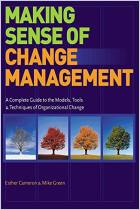
Change Management Masterclass
A Step-By-Step Guide to Successful Change Management
Recommendation
As former British Prime Minister Harold Wilson once said, “The only human institution which rejects change is the cemetery.” For firms that are all too aware of this fact, English business consultant Mike Green provides a comprehensive, if at times ponderous, examination of change management. He considers various models that have defined the field since the 1950s and examines contemporary theories. His book delves into a grab bag of change management “metaphors and paradigms,” from the classic construct of “freezing” and “unfreezing” organizations to recent thinking comparing organizations to “machines” or living “organisms.” It includes detailed case studies of good and bad change management, and a step-by-step guide to achieving positive change. The book is at its best when it looks at corporations the way an anthropologist would examine strange cultures, detailing phenomena like the “shadow” or dark side of organizations. Alas, Green’s sociology jargon and seemingly pedantic mathematical formulas for change makes his work sometimes sound academic. You may wish for more short, pithy sentences. But, if you can handle those stumbling blocks, getAbstract finds that this is an in-depth, valuable organizational-change resource.
Summary
About the Author
Psychotherapist Mike Green has worked in change management for more than 20 years. He runs Transitional Space, an organizational development consultancy. He is a Visiting Executive Fellow at Henley Management College, Henley-on-Thames, Oxfordshire, England.


















Comment on this summary or Comenzar discusión